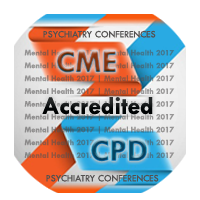
Margret Gisladottir
Landspitali University Hospital, Iceland
Title: A applicability of psycho-educational intervention for primary caregivers of people with eating disorders or attention deficit hyperactivity disorder
Biography
Biography: Margret Gisladottir
Abstract
Statement of the problem: Caregivers of young people with eating disorders (EDs) or attention deficit hyperactivity disorder (ADHD) are known to suffer difficulties and require support. Individuals with EDs usually develop impaired mental, physical, and social health, resulting in diminished insight. ADHD may affect the performance in school and social relationships including emotional instability. This can burden the caregivers of individuals with EDs or ADHD and some suffer from distress and depression. A training intervention for caregivers can equip them with the necessary supportive skills. The purpose of the study was to develop and evaluate the benefit of a therapeutic conversation intervention (TCI) for caregivers of daughters/sons with EDs or ADHD.
Methodology & Theoretical Orientation: A quasi experimental design was used and eff ects were assessed for statistical signifi cance
using ANOVAs and paired t-tests. Th e Calgary Family Assessment and Intervention models, the Illness Beliefs Model and the New Maudsley method were used as theoretical frameworks. Th e study was based on caregivers (N=50) of individuals (12-24 years) with EDs (A) and on caregivers (N=60) of individuals (13-17 years) with ADHD (B). Measurements were conducted post-intervention and at follow-up.
Findings & Significance: The EDs study revealed significant differences in primary caregivers perceived support, illness beliefs and quality of life, self-efficacy, care giving demands and patient behavioral diffi culties post intervention and at follow-up. The ADHD study revealed significant improvement in primary caregivers’ quality of life post intervention and at follow-up.
Conclusion: The study’s results shed light on how health care professionals may help caregivers of young people with EDs and ADHD in their supporting role. In turn, the treatment information can improve service in health care centers and hospitals.
Table 1. Treatment overview of TCI and evaluation time points
|
Quasi-Experimental Design and Measurements |
||||||||
|
|
Intervention |
Follow-up |
||||||
|
Weeks |
1 |
2 |
3 |
4 |
5 |
..8 |
..12 |
..16 |
|
Study A N = 50 |
GS 1 |
GS 2 |
GS 3 |
CS 1 |
CS 2 |
BS 1 |
BS 2 |
BS 3 |
|
Study B N = 60 |
GS 1 |
GS 2 |
CS 1 |
CS 2 |
|
BS 1 |
|
|
|
Weekly attendance |
Monthly attendance |
|||||||
TP1 TP 2 TP 3
Note. Four months attendance in Study A and two months attendance in Study B.
TP = time point; GS = group session; CS = care giving session; BS = booster session.

